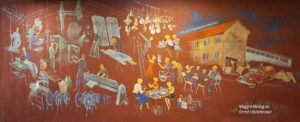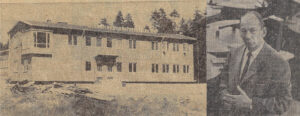HISTORY
Jönköping Armaturfabrik – the company that later became Mo Mekaniska – founded in 1952 by Sture Lantz, an engineer. The product portfolio was broad to say the least, as they manufactured everything from domestic fittings to cold room fittings for merchant and warships, ship cabin doors, engine cowlings for DC-6s and hydraulic aircraft stairs.

An unusual venture that lifted an entire community
Orders were good, the business was going well and six years later the company was ready to expand, both in terms of space and personnel. Something that led to the odd event that a well-established factory moved its entire operation from the city to the countryside. Within the city limits of Jönköping, there was no possibility to expand, while the fierce competition for labour made it difficult to recruit in the city. Norra Mo municipality saw an opportunity in getting a long-awaited “life injection” at a time when the flight from the countryside was at its greatest. So they stepped in and partially financed the construction of a brand new factory in Bottnaryd, where Sture now brought in machines as well as 16 workers and their families. Armaturfabriken became the largest company in the municipality with its 40 employees and the population of the small village increased by as much as 15%. The investment also led to a total of twenty new residential homes being built in the community.

Eye on the horizon
In the same vein, Sture made the assessment that the company’s future lay in investing fully in manufacturing high-quality products for the shipbuilding industry. The fittings part was thus disposed of. The new name of the company now became Mo Mekaniska AB with products such as steel doors, davits, winches, hatches, bollards, scuppers, etc. The business idea was enhanced even more by focusing on custom manufacturing the products completely according to each customer’s specifications and requirements. The company’s market soon went from including Sweden to all of Scandinavia. Towards the end of the 1960s, the range consisted almost exclusively of maritime articles which were exported throughout Europe.
Many captains and sudden course changes through the years
In 1973 Sture was ready to retire and the company was sold to the Norwegian shipyard group Ankerlökken. The years that followed were tough, the company was weighed down with more and more employees and a cumbersome administrative system, and Mo Mekaniska was running at a loss. Another strong contributor to declining profitability was the shipbuilding industry’s first real crash in 1974. There were concrete plans to close down Mo Mekaniska, but two alternatives were found. The first was to sell to a competitor, the second to sell to Sture’s sons, Ulf and Christer, who had both worked in the company since 1966. Fortunately, the latter option was chosen and the brothers took over the company in 1977. Christer was appointed CEO and a purposeful investment in marketing got under way. Agents and distributors were vigorously purged and instead it was Christer who travelled all over the world. After 1982, only doors were produced.

After a few years, the number of days on the move became increasingly burdensome. In 1987, the brothers sold 43% of the company to Isolamin, a manufacturer of ship bulkheads based in Luleå. Momec was run under this structure until 2015 when the company was sold to private investors in Jönköping. After a number of profitless years, the company went bankrupt in 2021. The bankrupt estate was bought by the industrial group Weland AB, primarily with the aim of acquiring the premises. On closer inspection, however, they saw potential in the Momec brand and decided to invest in order to breathe life into the business.
New winds
Weland’s ambition is now for Momec to regain its position as a world-leading manufacturer of steel doors for the marine environment. We also see interesting opportunities to develop doors for the property market and demanding public environments. In order to create the conditions for rapid growth, a major investment is being made in developing the business in 2024. Personnel, technology and sustainability are priority areas, as well as complete renovation of the premises in Bottnaryd and upgrading of the machinery to ensure increased production capacity. New history is being written all the time…
